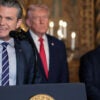There has been increasing opposition from Republican Senators to vote for New START, a nuclear strategic offensive arms control agreement with the Russian Federation, during the upcoming lame duck session of the Congress. Most recently, their ranks were joined by Senator Bob Corker (R-TN), whose chief of staff, Todd Womack, stated that “Senator Corker believes it is far more appropriate to deal with major pieces of legislation like this in settings other than a lame duck session.”
Senator Corker is right. There are substantive issues in the treaty that need to be resolved. Of the major nuclear arms control treaties between the United States and the Soviet Union and later the Russian Federation, none have been voted on in the U.S. Senate during a lame duck session. The vote in the lame duck session would not give newly seated Senators time to become educated on the content of the treaty. On the other hand, the treaty would be returned to the Committee upon the expiration of the current Congress and would provide more time for Senators to give due diligence to New START.
In addition, the process by which this treaty has been considered by the Senate Foreign Relations Committee has been negligent. In 12 hearings there were only two voices of opposition out of 22. New START received only 12 hearings in the Senate Foreign Relations Committee and three in the Senate Armed Services Committee. By comparison, the Intermediate-Range Nuclear Forces treaty received more than 45 hearings. The Strategic Arms Reductions Treaty II received at least 50 hearings.
The Obama Administration has refused to share the full negotiating record with the Senate, which would help to clarify both the intentions of the two parties and what concessions had to be provided in order to reach the agreement with Moscow. The rush to ratification undermines the Senate ‘s ability to fulfill its responsibility under the advice and consent authority the Constitution assigns to it.
In the light of the Russian Duma’s International Affairs Committee’s recent decision, it does not appear that the Russian Federation is committed to treaty’s ratification. The committee has decided to delay its consideration of the legislation that would authorize the ratification of New START by the full Duma. The Duma Committee’s action raises a number of questions for the U.S. Senate that must be clarified before the Senate moves to consider the treaty.
Co-authored by Michaela Bendikova.
































